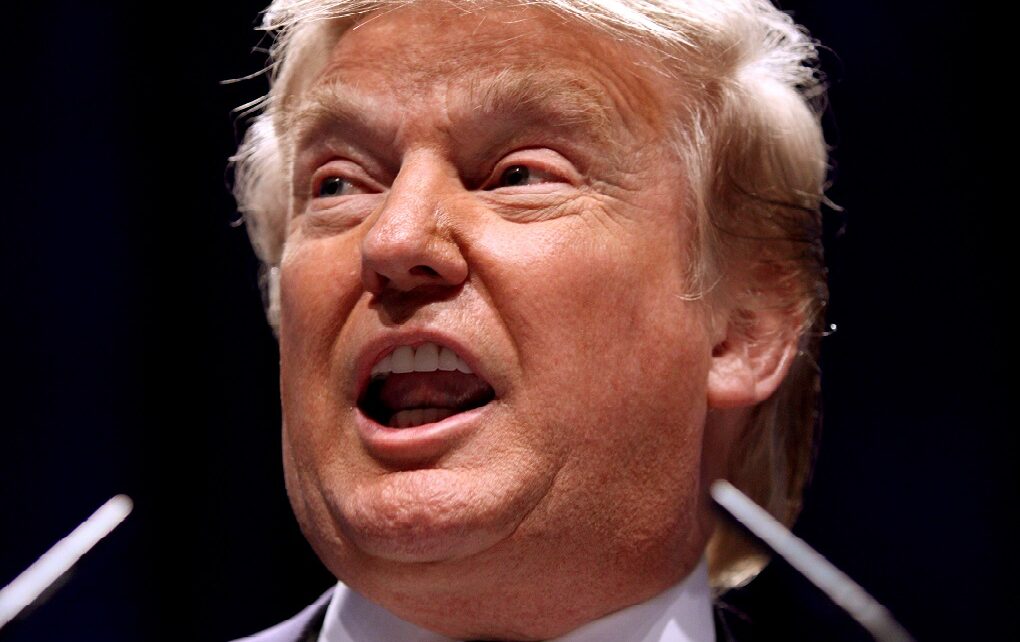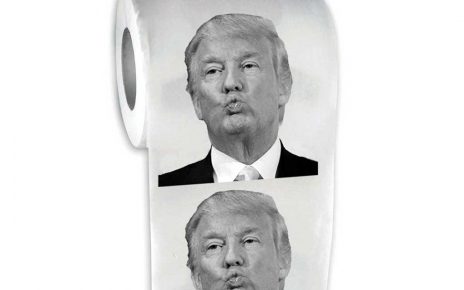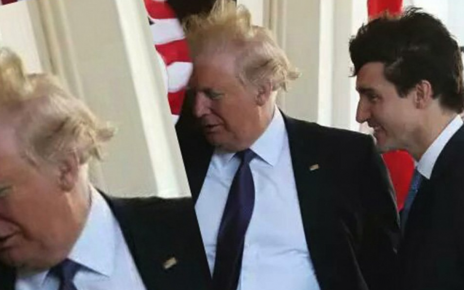The New World
I’ll begin with a blunt statement: from a moral perspective, in the few short years between 2015 and 2021, the world was transformed.
As a consequence of this transformation we now occupy a new world: a world where ethics and morality have been hollowed out, where integrity, honesty and intelligence are devalued, a world where the overload of information, opinion and belief leaves us disorientated and confused.
This is the world epitomised by former and potentially future President of the United States, Donald J. Trump. It’s the world of Johnson in the UK, of Putin in Russia, of Modi in India and Bolsonaro in Brazil. In this new world – as Trump, Modi, Bolsonaro and Putin repeatedly warn us – we must not trust our judiciary, our civil servants or our journalists. Teachers, academics and experts of all kinds are not to be taken at their word. Here, in this new world order, no one can be trusted. Everyone’s our enemy.
Take a quick look at social media and you’ll see the truth of this. A war is underway. Our new world is packed with conflict, friction, outrage and fear.
This combative world order hasn’t sprung from nowhere. Its origins are as visible in the eras of Clinton and Blair as they are in those of Reagan and Thatcher: the increasingly political use of language; corporate globalisation; the centralisation of power and wealth among an unaccountable elite.
In praise of ex-President Trump
Despite what his critics say, and despite his unparalleled humility, ex-President Donald John Trump is not wrong in his grandiose assessment of himself. By his own measure he’s the most successful president the United States has ever seen.
Let’s look at his accomplishments.
- Trump created the most pervasive leadership brand ever encountered in the modern world. What distant and secluded land would you need to inhabit for his name to be unknown to you? Johnson and Farage are PR novices in comparison to Donald Trump. A branding triumph!
- For the duration of his presidential term, and in the eighteen months leading up to it, Trump placed himself well and truly at the centre of world attention. The world’s media attended to his every tweet. With almost neurotic anxiety the leaders of other nations pondered his every move. He inserted himself into our lives on social media, on television, in the papers… even, it sometimes seemed, into our nightmare-ridden nights. What celebrity, what brand leader, what president could have hoped for more?
- During his tenure he wrong-footed his critics at every turn. Criticism on ethical grounds, on fiscal grounds, on the grounds of political procedure or presidential responsibility left him unscathed. And for those of his opponents who wanted to ‘work with him’, to seek a bipartisan compromise… well, they might as well have tried to compromise with a stone.
- He achieved levels of polarisation, disruption and division greater than even he could possibly have desired. He created and exulted in crisis after crisis. Disruption gave rich pickings to the dog-eat-dog world in which he believes. The outcomes of Crisis A, Emergency B or Catastrophe C hardly mattered so long as they didn’t personally harm Donald Trump. The manufacturing of each crisis was its own success. It took a crisis that he hadn’t manufactured to finally buck the trend.
- He undermined the checks and balances of governance, both within the United States and internationally. Neither he, nor the types of leader he admires (Putin, Kim Jong-un, Erdogan), believe in such checks or balances. They’re a nuisance – and best got rid of.
- He increased the wealth of the corporations and the super-rich, himself and his family included.
- He eased the path of big business in the United States, removing the regulations and controls hated by his billionaire allies and friends.
- He reinforced the power of the political Right, giving them an edge in the highest US courts for generations to come. We’re seeing the impact of that now, with the Roe vs Wade dismissal by the Supreme Court.
- He inspired a network of mimics – would-be oligarchs and plutocrats – all around the world.
- Despite his inherited wealth and single-minded focus on personal gain, he convinced large numbers of voters that he’s a man of the people – that he’s fighting their corner. Even now, most of those he convinced to vote for him in 2016 would vote for him again.
I could go on. These are not the achievements of a failure. In fact, in the light of such successes, Obama and Biden look like the small change in Donald Trump’s pocket.
But there’s a catch. The wins of Donald Trump did not translate into wins for ordinary Americans. In fact, from an ethical perspective, President Trump’s many successes delivered considerable harm.
The impacts of Donald
Ex-President Trump is not an inconsistent man. Though his opponents may claim otherwise, they are inspecting him at too small a scale. Close up, decision by decision, he seems unpredictable, unreliable and contradictory, but if we step back we can see that he lives by a clear and well-defined code of behaviour. It’s this:
👉 I’m only in it for what’s in it for me
👉 Winner takes all
👉 Whatever it takes to get you what you want, that’s ok
He makes no bones about this being his criteria of good conduct. And he applies it with rigor.
And here’s another of Trump’s great triumphs: his ethic of “I’m in it for Number One” has taken our world by storm. It’s become the dominant meme of our television and social media, the dominant philosophy of our politics, our economy and our everyday working lives. The more traditional codes of conduct have been swept aside. They’re part of the old world, not the new.
Donald Trump’s tenacity and ability to follow through on this code (supported by his media allies, by the majority of US wealth-hoarders and by the religious right) has had a profound impact. It’s legitimised:
- The demotion of truth. If self-interest is more important than truth, then why should truth matter? If truth doesn’t serve your interests, discard it. This is core Trump: truth comes second; personal gain comes first.
- The relativity of truth. It’s commonplace now to suggest that we’re all the owners and sole arbiters of the facts. “Facts are subjective,” we’re told. “Everyone selects their own facts.” And, given the demotion of truth to the role of subservient bystander, it’s not surprising that the world of truth and fact should seem this way… Truth becomes whatever we assert it is in order to serve our own interests… So why should one person’s truth be any better than another’s?
- A tolerance of lies. If personal gain is everything, why wouldn’t you tell lies to achieve that gain? It’s a no-brainer. Presidents and Prime Ministers lie and gets away with it. President Trump lied and lied again, and achieved adulation and wealth, and more votes in 2020 than he received in 2016. And look at our elites – the rich, the educated and the powerful – they all tell lies… so why shouldn’t we?
- A polarization of opinion and the weaponisation of memes. The ascendancy of self-interest goes further. If self-interest is paramount, then why shouldn’t I believe in anything I want to believe in, in whatever suits me or appeases my inclination, my latest, basest appetites or instincts? And, if truth is – in our new world – fundamentally irrelevant, then why not stick to my self-approving and self-interested opinions and beliefs no matter what? They become a form of territory. The old-fashioned version of truth has no bearing on the matter. I’ll defend my territory no matter what. And I’ll assert my territorial rights to my opinions over your territorial rights to yours by whatever means available. Facts are just tools to support a cognitive imperialism. Areas of contention (vaccination, taxation, healthcare, Brexit, abortion) are just weaponised memes deployed for self-interested purposes. The facts surrounding these issues? Who cares one iota about facts?
- An encouragement of distrust. In our new world, where our code is “Dog eat dog” and “Each for his own”, who can we trust? In fact – and this is on-message Trump – you shouldn’t trust anybody. They are out for themselves – and that’s how it should be. That’s how they succeed. And it’s how you should be, too. We’re all individualists in a win/lose world. Society? Solidarity? What do those words even mean?
- The hollowing out of morality. So the message is very simple. In fact, its simplicity is its attraction. You don’t have to think too long or hard about the impacts of what you do. You don’t have to worry too much about ramifications or implications. Ignore complex stuff like integrity and caring what happens to others. Look after yourself. That’s the way the world works. Everything else is irrelevant.
- The neutering of integrity. So, in this simple and straightforward world where self-interest is king, integrity becomes as irrelevant as truth. We live in the real world. Let’s focus on what matters. Let’s look out for ourselves.
- The politicization of language. Given all the above it becomes clear that to use words as a mechanism for meaningful communication, a sharing of understanding or a way of achieving intellectual agreement is a non-starter. Why go down that route? It’s arduous and slow and doesn’t serve self-interest. What does it matter if what we say is consistent or inconsistent, true or false, kind, unkind, moral or immoral? It only matters that it gets us what we want. Words are tools of manipulation. The language of our new world is the language of the bludgeon, the language of the bully, and, almost by definition, the language of propaganda. The super-successful Donald Trump (super-successful by his own value-system, at least) reflects this use of language. He’s a genius of manipulative verbiage, a super-producer of propaganda. And since propaganda is not a discussion, it means that aspiring to meaningful dialogue with a person like Donald Trump (or Johnson, Modi or Bolsonaro) is problematic. It’s a little like trying to speak Russian to a fish. Propaganda isn’t communication. Russian isn’t a language which a fish understands. The propaganda needs to be dealt with first, on its own terms, as propaganda. Talking can come later.
These impacts are not accidental. They are perfectly consistent with the ethic of self-interest. Their message is appealingly simple. Go for what you want. Do what you want to do. Use language how you like. Use truth if it suits you. If it doesn’t, don’t. Brazen dishonesty is honesty: it’s being honest about being dishonest. And being dishonest when it serves your interests is what any sensible person would do.
But just because these impacts of the era of Trump are coherent and – despite what many critics claim – attractively straightforward, this doesn’t make them beneficial. In fact, the reverse is true.
How societies survive
In my book Intelligent Ethics I argue that a coherent ethical code is essential to the survival of human civilisations. A shared code of behaviour is the glue that holds us together, the oil that allows the wheels of society to turn. But not any code of behaviour will do. The capitalism which carried our world towards the greatest levels of prosperity humanity has ever known would never have been so successful if, right from the start, you couldn’t take a person for their word. It would never have worked if ruthlessness and vicious self-interest were the only factors at play. Other essential inputs were needed, like integrity, like honesty, like a determination to repay your debts, like a recognition of fairness in the making of a deal – codes of behaviour rooted in the religions and moralities of the day. And, for businesses to thrive throughout a whole nation or across the whole world, these other factors require universality. I don’t just need to know that I can trust you when you’re right here in my face; I need to know that I can trust you when you’re four thousand miles away – and yet somehow connected to me by our cleverly constructed web of commerce and social interaction.
In the ethics of our new world, the world of Trump, Bolsonaro, Modi, Johnson and Putin, there are only two drivers of behaviour: self-interest and fear. Do whatever best serves your self-interest or do what you are forced to do by fear of repercussions or reprisals. But these two codes don’t give you the universality that a functioning morality needs – the type of functioning morality that any human society needs if it is to flourish or even survive. A morality capable of sustaining flourishing societies needs to be transferable. It can’t be based on just doing a thing because it suits you or me, here and now. It needs to be based on doing it because it’s the right thing to do. You do it wherever you are, no matter what the immediate benefits or costs, no matter whether or not you are being watched. You do it because it’s your duty. You do it because that’s how moral people behave.
Pure selfishness cannot give you this universality, this transferability on which social cohesion depends. Even the selfishness of groups, clans, classes or nations won’t provide this. Nor will fear. We’ve seen again and again throughout history the fate of societies whose ethos has atrophied into one based on selfishness or fear. They are no longer with us – or, where they are, they are failing to thrive. In the main we now live in the most successful civilisation there’s ever been: billions of humans working together to sustain the modern world. But this has only been possible because of shared systems of value inherited from the past. Value systems which our new world is pushing to one side. Our wonderfully successful civilisation is in danger of failing because it is losing the systems of value which allowed it to arise.
And other dangers, too, are coming to the fore:
- The overweening power of monopolistic corporations
- The relentless centralisation of economic power and wealth
- Technological disruption
- Unregulated advances in genetic engineering and AI
- The ransacking of the natural world
- The appalling risks of climate change
The ethos of our new world, the demotion of truth, the encouragement of distrust, the hollowing out of morality and the politicization of language cannot cope with these dangers. It is in fact sustaining and fuelling them.
Something else is needed. An ethos which can tackle both the dangers that we face and the incredible opportunities which might otherwise await us.
Ethics reimagined
In Intelligent Ethics I construct an ethics capable of addressing these imminent and escalating threats. I identify a source of moral authority which is simple and straightforward, yet retains the features of universality, transferability and intelligence. You may not agree with this source – but you can still agree with the core moral aims which I derive from it, moral aims which are now essential to the survival and flourishing of the human world.
I illustrate these aims below:
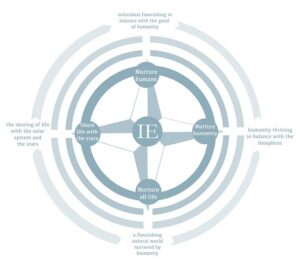
The moral compass of Intelligent Ethics
The first two of these core moral aims – the nurturing of humans as individuals and the nurturing of humanity as a whole – are not unusual. They’re common to many ethical systems. They provide a basis for mutual trust. The moral person doesn’t just look out for themselves, they look out for the people around them, too. The moral person doesn’t only care about their own isolated community of neighbours and friends, they recognise that we’re all in the same boat, all part of the same species, and that for a child to suffer on the other side of the world is equally as bad as for a child to suffer in our own home.
The third moral aim of Intelligent Ethics is the nurturing of all life. This is an aim we need to embrace if we hope to prevent species extinction – our own and many others. In asserting this aim, we show that we value not just the thriving of one another and our own species, but also the thriving of the life all around us, the biological world on which our civilisation and the survival of our species depends.
And the fourth? This is subsidiary to the first three. No matter the ambitions of our billionaires or our governments, they will never succeed in delivering sustainable life to other habitats or planets if we’re unable to sustain life here on Earth… And yet the sharing of life with the solar system and the stars is not a trivial ambition. Imagine if we are able to renew our world, if we are able to create a world of justice and sustainability. What then? Humans are not built to idle away their lives in Utopia, even if such a Utopia is achievable. Our species needs a mission, and what greater mission could there be, after we’ve resolved our issues at home, than the sharing of life with the bleak spaces beyond the boundaries of our world? Life gives meaning to a universe of dead matter. Why not take that meaning to places where none has been before?
A new way of seeing
But asserting our commitment to humans, to humanity and to all life is not quite enough. We are still trapped in a world of propaganda, a world of manipulative language, of dishonesty and division. If we want our society to survive, if we are keen to reorganise it on ethical lines, then we need to learn how to penetrate the barrage of propaganda, disinformation, fake news and spin. We need to unshackle our minds.
My second book, Ethical Intelligence, a companion to Intelligent Ethics, outlines a number of techniques for this:
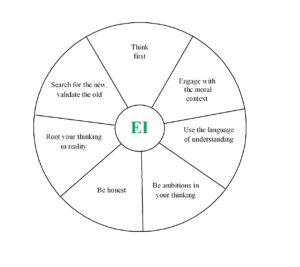
The seven disciplines of Ethical Intelligence
Or, in more detail:
- Think first. Don’t wait for someone or something else – person, algorithm or machine – to do your thinking for you.
- Embed your thinking in the moral context. Question the decisions and actions that social media, your politicians, the news channels and even your friends are encouraging you to agree with or do. How do they fit in with what ‘being a moral person’ means?
- Use the language of understanding. Understanding encourages tolerance. It encourages true communication rather than the use of words to manipulate. If we have disagreements we can reassess the basics of our understanding, the evidence on which it is based, and come to an improved understanding on which we both agree. We use language like, “My understanding is this…” Or “With the information I have so far it looks as if…” Or “Help me understand…”
- Be ambitious in your thinking. Humanity has accomplished wonders – and we’ve only just begun. Why not create the beautiful, the astounding, the original? Why not turn our world around and make it work in brand new ways?
- Be honest. Value honesty in your words, your thinking and your actions. Value it in the words and actions of others. A dishonest person is not moral. A person with integrity does not lie.
- Root your thinking in reality. Base your understanding on the evidence. The more closely your personal ‘map of the world’ meshes with reality, the more empowered you will be in owning your own life, in understanding what is influencing you and in contributing to an ethical world.
- Aim for ever greater understanding. It’s in the nature of understanding that it can always improve. It’s in the nature of our universe that total, inflexible certainty about just about anything is almost certainly a mistake. Far better to be alert to new evidence and be ready to adapt and improve.
With these disciplines to assist us, and with our core moral aims to hand, we are now better prepared to deal with the harmful transition that’s overtaken our world.
The restoration of trust
The demotion of truth in the world of Trump, in the world of Brexit, in times of war, results from truth’s usurpation by self-interest. But if we assert and affirm the moral context it becomes clear that self-interest alone cannot provide the weight or authority needed to sustain our world. If societies are to work then we need to apply a more sophisticated code of behaviour, a morality where other people matter, where truth cannot be whatever I choose it to be. My truth needs to be your truth, too. We need a morality that’s universal: applying in your neck of the woods as well as in mine. If we are to work together to sustain a complex and thriving society then the normalisation of dishonesty must be reversed. This isn’t even a moral statement: it’s common sense. Dishonesty undermines cohesion. Dishonesty damages our ability to work together to produce wonderful things, like science, medicine, culture.
A flourishing society and a thriving civilisation needs a morality that hasn’t been hollowed out, it needs an ethics that’s not a husk of what it’s meant to be. It needs values that affirm integrity, intelligence, reliability, selflessness. And it needs a language which is not politicised, a language which resolves conflict rather than exacerbates it, a language of communication and understanding rather than one of propaganda, manipulation and control.
Repeatedly politicians, journalists, corporate bosses and financiers ask, “What can we do to regain your trust? How can we restore your faith in us?”
There’s a simple answer to this question.
You can trust a moral person.
You can trust a moral person because a moral person cares about you as well as about themselves. A moral person tells you the truth. A moral person does not seek wealth, profit, power or prestige to the detriment of others. Their morality sees other people as equal. That’s what justifies your trust.
Honesty, morality and integrity, in our politicians, our journalists and in ourselves, are the stepping stones to a world of trust. Not Trump’s world. Not Johnson’s, Putin’s or Erdogan’s world. Our world. Our new, ethical world.
With thanks to Gage Skidmore from Peoria, AZ, United States of America, CC BY-SA 2.0 <https://creativecommons.org/licenses/by-sa/2.0>, via Wikimedia Commons for the Trump image.
Luke Andreski
Luke Andreski is a founding member of the @EthicalRenewal and Ethical Intelligence collectives. His books include Intelligent Ethics (2019), Ethical Intelligence (2019), Short Conversations: During The Plague (2020) and Short Conversations: During the Storm (2021).
His free eBook Our society is sick, but here’s the cure is out now.

You can connect with Luke on LinkedIn, https://uk.linkedin.com/in/luke-andreski-ethics, or via @EthicalRenewal on Twitter https://twitter.com/EthicalRenewal
Read more….
UK:
Ethical Intelligence:
www.amazon.co.uk/Ethical-Intelligence-Luke-Andreski/dp/179580579X
Intelligent Ethics:
www.amazon.co.uk/Intelligent-Ethics-Luke-Andreski/dp/1794618732
US and International:
Ethical Intelligence:
www.amazon.com/Ethical-Intelligence-Luke-Andreski/dp/179580579X
Intelligent Ethics:
www.amazon.com/Intelligent-Ethics-Luke-Andreski/dp/1794618732
